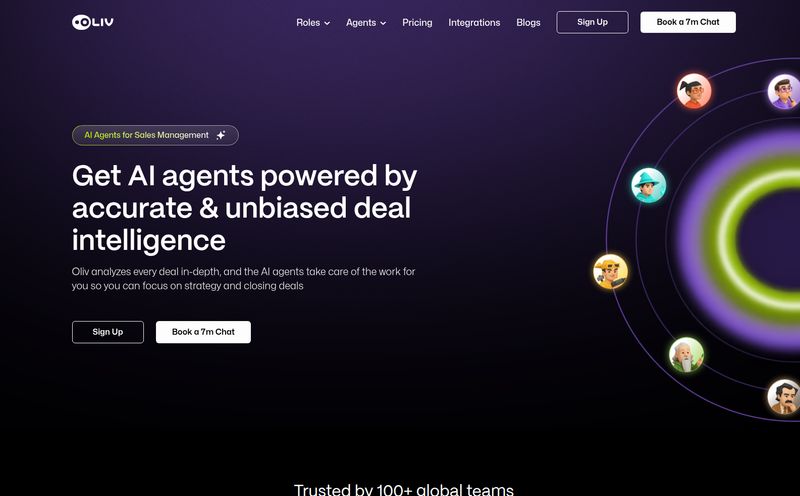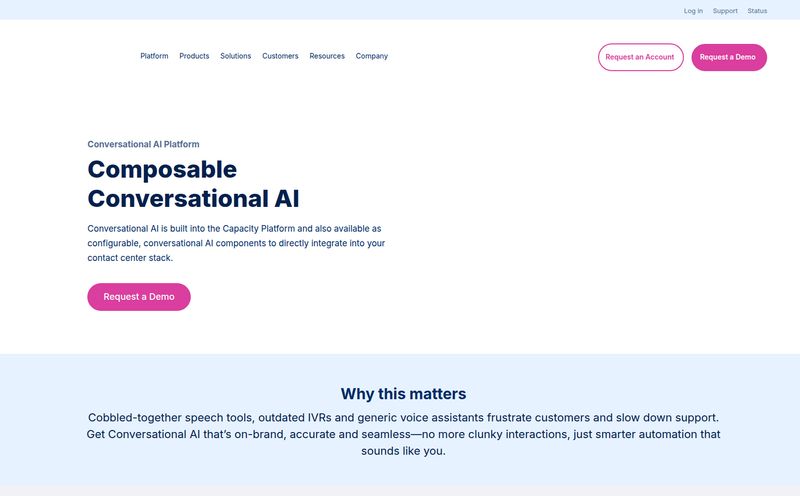If you're a healthcare professional, your relationship with technology is probably... complicated. For every piece of tech that genuinely makes life easier, there are three clunky, unintuitive EMR systems that feel like they were designed in 1998. So when another “revolutionary AI tool” pops up, a healthy dose of skepticism isn’t just warranted, it's a survival mechanism.
I’ve seen so many platforms promise to change the game. Most of them just add another login to remember and another workflow to learn. But every so often, something cuts through the noise. I’ve been hearing whispers about Medcol.io for a little while now, an AI clinical assistant that claims to be different. So, I decided to roll up my sleeves, sign up, and see if it's the real deal or just another piece of digital clutter.
What Exactly is Medcol AI?
In simple terms, Medcol is an AI assistant built specifically for clinicians. Think of it less as a search engine and more as a brilliant, endlessly patient research fellow who has read literally everything. And when I say everything, I mean it's been fed a diet of over 22 million medical articles. That’s a knowledge base that no human could ever hope to match.
It uses something called RAG (Retrieval-Augmented Generation) technology, which is a fancy way of saying it doesn't just make stuff up. It actively pulls information from its vast library to answer your clinical questions. This is a huge deal. It’s the difference between asking a search engine “what causes chest pain?” and getting a list of a million possibilities, versus presenting a specific patient's case and getting a concise, evidence-based differential diagnosis. It understands context, which, as any clinician knows, is everything.

Visit Medcol.io
The Features That Actually Matter
A long feature list can be deceptive. I’m more interested in what a tool actually does to make a grueling Tuesday afternoon clinic more manageable. Medcol has a few things that genuinely caught my eye.
More Than Just a Differential Diagnosis Generator
Okay, the differential diagnosis (DDx) generator is its bread and butter. You input patient findings, and it spits out a ranked list of potential diagnoses with supporting evidence. It’s fast and surprisingly accurate. But where it gets interesting is that it doesn’t stop there. It helps you formulate a clinical plan (Tx), suggesting next steps for investigation and management. It turns a what-if into a what-now, and that’s a critical step.
Specialized AI Brains for Cardiology and Neurology
This is what separates it from more generic medical AI. The platform includes an AI-cardiologist and an AI-neurologist. Having specialized modules suggests a deeper level of training and nuance. If you're working up a complex neurological case, you’re getting insights from a part of the AI that has been specifically tuned for that specialty. As a generalist, having that specialized backup on demand is incredibly appealing.
Security is Not an Afterthought
Let's talk about the elephant in the room with any health tech: patient privacy. It's a non-negotiable. I was relieved to see that Medcol makes a point of its HIPAA and GDPR compliance. This isn’t some fly-by-night app playing fast and loose with data. They understand the gravity of handling protected health information, which allows you to use it with a clear conscience.
My Honest Take on Using Medcol
So, what’s it like in practice? The first thing that struck me was the user interface. It’s clean. It’s simple. It doesn’t feel like a chore to use, which is more than I can say for some other software I'm forced to interact with daily. The speed is also impressive. In the time it takes to grab a coffee, you can have a well-reasoned DDx that might have otherwise taken you 30 minutes of digging through UpToDate or other resources.
But let's be real, it's not magic. The old mantra of “garbage in, garbage out” absolutely applies here. The effectiveness of Medcol is directly proportional to the quality of the clinician's findings you provide. If your initial examination is sloppy, the AI's suggestions will be, too. It’s a tool to augment your clinical reasoning, not replace it.
Some of the features are still in beta, and you can occasionally feel that. You might get a suggestion that seems a little left-field. But I see that as a good thing. It forces you to engage critically, to ask “why did it suggest that?” and in doing so, you either solidify your own plan or discover a new angle you hadn't considered. You just have to go in with your professional judgement switched on, which you should be doing anyway.
Let's Talk About the Price Tag
Alright, the all-important question: what’s this going to cost? Medcol has a tiered approach that seems pretty reasonable, honestly.
You can get your feet wet with a Free plan. It gives you five free generations to see how it works. It's a proper try-before-you-buy, which I respect. After that, you'll need to consider a paid plan.
The Pro plan is $20 per month. For what you get—40 generations a day, access to the specialist AIs, and the ability to save your case history—that feels like a steal. That's less than a few fancy coffees or a single textbook, and the time it could save you would pay for itself almost immediately.
For practices that are all-in, they've been running a limited Lifetime Access deal for $500. It's a one-and-done payment for all Pro features, forever. A bit of a gamble on a newer platform, perhaps, but it could pay off big time if this becomes a daily driver in your practice. Then there's the predictable Enterprise plan for large clinics and hospitals, which involves custom integration with EMR/HIS systems and a 'let's talk' pricing model.
| Plan | Price | Key Features |
|---|---|---|
| Free | $0 | 5 total Medcol AI generations, DDx generation. |
| Pro | $20 / month | 40 daily generations, case history, AI-cardiologist & AI-neurologist. |
| Lifetime Access | $500 (one-time) | All Pro features, forever. A limited offer. |
| Enterprise | Custom | EHR/HIS integration, unlimited credits, pre/post-visit analysis. |
Who Is This Tool Actually For?
So who should be signing up? In my opinion, Medcol hits a sweet spot for a few groups. Tech-savvy solo practitioners or those in smaller clinics who want access to cutting-edge tools without a huge enterprise budget will love this. It's also a phenomenal educational tool. I can see medical students and residents using it to test their diagnostic skills and broaden their clinical knowledge in a safe, simulated environment.
Is it for the tenured, old-school physician who still dictates their notes and is wary of new tech? Probably not. You have to be willing to embrace a new way of working. But for the modern clinician looking to be more efficient, more accurate, and maybe even have a little more time to spend on the human side of medicine, it's absolutely worth a look.
At the end of the day, AI isn’t going to take your job. But a clinician using AI might. Tools like Medcol are not just a passing trend; they represent a fundamental shift in how we can access and apply medical knowledge. It’s not about letting the machine think for you. It’s about giving your own brain a powerful partner to think with. The question isn’t if AI will become a standard part of medical practice, but which AI you’ll choose to have in your corner. Medcol is making a very strong case for itself.
Frequently Asked Questions
- Is Medcol.io safe to use with patient data?
- Yes, it is. The platform is designed to be HIPAA and GDPR compliant, which are the highest standards for patient data security and privacy in the US and Europe. They take data protection seriously.
- Can Medcol AI replace a specialist consultation?
- Absolutely not. Medcol is a powerful decision-support tool, not a replacement for a specialist. It's designed to help you organize your thoughts, consider possibilities, and formulate a plan, but it should never override the collaborative process or a formal consultation with a specialist.
- How accurate is the Medcol AI?
- The accuracy is reported to be high, especially for differential diagnosis. However, its accuracy is heavily dependent on the quality and completeness of the clinical information you provide. It’s a professional tool designed to augment, not replace, a clinician's expertise.
- What's the main difference between the Free and Pro plan?
- The Free plan is a limited trial with only five total AI generations. The Pro plan ($20/month) is the full-featured version, offering 40 generations daily, the ability to save your case history, and access to the specialized AI-cardiologist and AI-neurologist.
- Do I need to be a tech expert to use Medcol?
- Not at all. The interface is intentionally designed to be clean, intuitive, and user-friendly. If you can use a modern website or app, you can use Medcol without any trouble.



